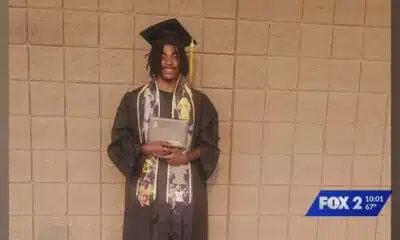News from the South - Texas News Feed
Texas lawmakers want an easier way to override vetoes
“Overriding a Texas governor’s veto can be impossible. Lawmakers are trying to change that.” was first published by The Texas Tribune, a nonprofit, nonpartisan media organization that informs Texans — and engages with them — about public policy, politics, government and statewide issues.
Sign up for The Brief, The Texas Tribune’s daily newsletter that keeps readers up to speed on the most essential Texas news.
The last time the Legislature overrode a governor’s veto on a bill was in 1979, when William Clements was governor.
It’s not that members don’t want to exercise their legislative authority — meant to be equal to the executive branch. It’s that in almost every case, they can’t.
Lawmakers can override the governor’s vetoes only during the session in which the bills are rejected, according to experts’ interpretation of the law. But typically, governors veto bills after sine die – the last day of session.
In 2023, Gov. Greg Abbott vetoed a nearly record-breaking 76 bills and one budget item— widely seen as his way to punish members for failing to pass his priority bills. Just two bills were vetoed during the session, in the window that lawmakers could have voted to override them.
Now, some lawmakers want to change that process. A proposal by Sen. Brian Birdwell would amend the Texas Constitution to allow legislators to briefly meet after the regular session ends to reconsider bills that passed by more than two-thirds of members.
The Republican from Granbury said at a March state affairs committee hearing that his resolution was not in response to Abbott’s vetoes, noting that he submitted the same bill prior to the end of last session. But he did highlight the high number of bills that passed last session with more than two-thirds support in each chamber.
According to an analysis by the Texas Tribune, 71 of the 76 bills that Abbott vetoed passed through both chambers with a veto-proof majority, or more than two-thirds support.
“My intent here is to restore the checks and balances of Texas government, and legislation that was passed by an overwhelming majority such as two-thirds reflects the importance of that issue to the constituents of the state,” Birdwell said.
He acknowledged at the hearing that lawmakers may not want to return to the Capitol after the session ends, but that his proposal could also boost legislative efficiency by preventing the Legislature from bringing up the same bills again the next session.
The infrequent overrides aren’t too surprising, given that both legislative branches and the governor’s office in Texas have all been led by Republicans since 2003, and are likely to share priorities — or at least refrain from challenging each other publicly.
Abbott’s vetoes in 2023 made up just over 6% of the 1,246 House and Senate bills passed during the regular session, but were the highest number since 2001, when then-Gov. Rick Perry vetoed 81 bills.
Sen. Sarah Eckhardt, a Democrat from Austin, signed on as co-author because she wanted to get the “right balance” between the executive and legislative branches, she said in an interview with The Texas Tribune.
“The massacre of bills was so broad, and it was all about retribution,” she said, referring to the Legislature’s denial of the school voucher bill and and on property taxes. “The governor didn’t even use a fig leaf to disguise that it was about retribution … I don’t believe that’s what the framers of the Texas constitution intended.”
Abbott vetoed 30 of the bills on one day, with a common message in many veto explanations: “At this time, the legislature must concentrate on delivering property tax cuts to Texans,” he wrote.
Last session’s vetoes drew a rare public critique from Lt. Gov. Dan Patrick: “It’s not a very good image to veto bills for no reason other than he didn’t get the property tax bill he wants.”
If it became law, the practice would align Texas with at least 25 other states that allow veto overrides after the session – either through a reconvening such as the one Birdwell is proposing, or during the next regular session.
Because it’s a joint resolution, Birdwell’s proposal doesn’t require the governor’s approval — but it will need support from at least a two-thirds majority in each chamber before being put to voters at a general election.
The measure passed the Senate unanimously in mid-April, but hasn’t been taken up by a House committee, with the end of session less than two weeks away.
Time isn’t the only challenge. Brandon Rottinghaus, a political science professor at the University of Houston, said he thinks the bill faces an uphill battle despite not needing the governor’s approval, because of the pressure Abbott can put on lawmakers.
The veto power is one of the clearest ways governors can flex their executive muscle, he said.
“The governor is as powerful as they’re able to make themselves, and the extent to which they can leverage the modest powers they have under the Constitution,” he said in an interview.
And even if it did pass, lawmakers could face retribution if they did vote to override a veto.
Additionally, Rottinghaus said, it’s rare to see major structural changes to the way the Texas government works.
“Texas’ government is designed to be small government, so any changes from that are usually met with resistance,” he said. “So even just inertia alone is enough to probably minimize this bill.”
Disclosure: University of Houston has been a financial supporter of The Texas Tribune, a nonprofit, nonpartisan news organization that is funded in part by donations from members, foundations and corporate sponsors. Financial supporters play no role in the Tribune’s journalism. Find a complete list of them here.
First round of TribFest speakers announced! Pulitzer Prize-winning columnist Maureen Dowd; U.S. Rep. Tony Gonzales, R-San Antonio; Fort Worth Mayor Mattie Parker; U.S. Sen. Adam Schiff, D-California; and U.S. Rep. Jasmine Crockett, D-Dallas are taking the stage Nov. 13–15 in Austin. Get your tickets today!
This article originally appeared in The Texas Tribune at https://www.texastribune.org/2025/05/24/texas-constitution-new-rule-veto-override/.
The Texas Tribune is a member-supported, nonpartisan newsroom informing and engaging Texans on state politics and policy. Learn more at texastribune.org.
The post Texas lawmakers want an easier way to override vetoes appeared first on feeds.texastribune.org
Note: The following A.I. based commentary is not part of the original article, reproduced above, but is offered in the hopes that it will promote greater media literacy and critical thinking, by making any potential bias more visible to the reader –Staff Editor.
Political Bias Rating: Centrist
The content presents a factual and balanced examination of the Texas legislative process concerning the governor’s veto power and potential constitutional changes. It provides perspectives from both Republican and Democratic lawmakers, includes expert analysis, and avoids overtly partisan language. The article focuses on governance, state institutional dynamics, and legislative procedure without promoting a particular ideological agenda, reflecting a centrist and neutral reporting style.
News from the South - Texas News Feed
It's a love story: Taylor Swift, Travis Kelce announce engagement
SUMMARY: Taylor Swift and Kansas City Chiefs tight end Travis Kelce are engaged, announcing it on Instagram with a photo of Kelce proposing in a garden and showcasing Swift’s dazzling “Old Mine brilliant cut” ring. The couple, both 35, began dating in 2023 after Kelce attended Swift’s Eras Tour. Despite early challenges, including Kelce’s unsuccessful attempt to give Swift a friendship bracelet with his number, their relationship blossomed. Swift has supported Kelce at numerous games, including two Super Bowls, while Kelce frequently attends her concerts. Their relationship has garnered massive media attention and was featured in ESPN’s documentary “The Kingdom.” Kelce’s parents praise their bond as genuine and deserving.
The post It's a love story: Taylor Swift, Travis Kelce announce engagement appeared first on www.kxan.com
News from the South - Texas News Feed
We're excited for National Dog Day!
SUMMARY: To celebrate National Dog Day, the studio welcomed three dogs: Mac, Sandy, and Leo. Sandy sports a playful lipstick kiss from Kim Castro, while lively one-year-old Leo kept everyone entertained. The dogs’ owners, also producers, shared that it’s usually breakfast, walk, or nap time for them. The studio enjoyed the furry therapy vibe and encouraged viewers to treat their dogs with special offers from PetSmart (buy one, get one 25% off on treats), Lazy Dog Restaurant and Bar (coupon with dog bowl and entree), and free Puppuccinos from Starbucks. Viewer-submitted dog photos added to the joyful celebration of our furry friends.
We had in-studio guests to help us celebrate.
News from the South - Texas News Feed
Racism Wrapped in Rural Warmth
Rural Texas wears a friendly facade. You know everyone, and everyone treats each other so kindly, but, if you’re Black, you just ignore the stares when you walk into the local steakhouse for fish fry night.
I was 7 or 8 when I realized I would always be treated differently than my white friends. It was picture day and I was waiting in line near our classroom and watching as my teacher fixed every girl’s hair. I eagerly waited for her to fix mine, but she never did. I assumed it was because my hair was already twisted into three cute ponytails, a classic hairstyle for little Black girls.
But when I got home and asked my mom, she told me my teacher didn’t know what to do since my hair had a different texture than my friends’.
When I was in the seventh grade, I was called the n-word. I didn’t need to ask my mom what the word meant; I already knew. You’re taught at a young age if you’re Black. You’re taught never to say that word. It’s a slur. It’s a dirty word. The kid who called me that slur was a bully and I was a straight-A/B student. I never did anything wrong. (I can’t even tell you what detention was like!) My mom expected the best, so I became the best I could be. I remember telling her and crying. I was hurt.
A day later, he apologized after my mom told the school. I was surprised the school took action even in the early 2000s. I don’t recall being called that slur again. This was part of the good side of growing up in a place I’ll call “Smallstown” (since I still live here), a southeast Texas town where about one in five residents is Black. Many people try to do the right thing.
But throughout my academic and personal life, I experienced subtler forms of small-town racism—warm and welcoming with flashes of ugliness.
In 2005, my brother, mom, and I went to a local clothing store to buy a suit for his high school prom. As soon as we opened the door, we were immediately greeted. You would think that would be amazing customer service, but it wasn’t friendly. Family friends, who are also Black, told us they’d gotten the same greeting—it was pure racism.
Being stopped at the door was embarrassing. My family doesn’t steal. If I can’t afford it then I don’t need it. No one in my family has shopped there since. But to this day, I still get followed at a local big box store, especially when I’m eyeing the latest gaming systems.
My mom raised me to be intelligent and to think creatively. I grew up around books and learned about the world around me. I was raised on academics and hoped my smarts and studies would take me far.
Sometimes I was made fun of for talking “white.” (To this day, I have no idea what that meant.) I didn’t speak like the other Black kids did so I suppose that gave others something to laugh about—a kind of reverse racism.
In high school, I discovered a love for rock music. I was the only Black girl at Smallstown High who listened to rock. I loved Slipknot and other popular bands. I still do. I remember a particularly odd moment in history class my senior year. Our teacher was a coach and, for him, the stereotype was true: Coaches that teach often don’t care about the subject. One day my musical preferences came up in class and the teacher said, “You’re a Black girl who likes rock music? I would have dated you in high school.” Everyone thought that was weird.
In 2007, I escaped Smallstown to attend Sam Houston State University (SHSU) in Huntsville, where fortunately, I had fewer experiences with racism. But I recall that when Barack Obama was reelected I and other Black students got a text warning us to stay indoors. Otherwise, nothing stood out. I felt my race didn’t matter in Huntsville. The “townies” (we loved calling Huntsville people that as if they were the visitors and we weren’t) treated me differently only because I was a college student—a younger, less-rooted resident. On campus, we treated each other like longtime friends. I joined the Black Student Alliance, the NAACP, and the Program Council. I befriended many people who didn’t treat me differently because of my race.
For years, I wondered why, and I think it’s because so many SHSU students grew up in bigger cities. When I mentioned how insular Smallstown was, they seemed confused. By the time I graduated, I had learned a lot about myself. The lessons I learned and the people I met stay with me.
But then I moved back to Smallstown. Some strangers stopped me to ask if I was aware of what shirt I was wearing. (Yes, it featured my favorite heavy metal band.) And others still spoke to me as if I were a child. I was shocked to realize that my experiences as a Black woman in rural Texas wouldn’t change just because I had gained a bachelor’s degree.
I started working at a grocery store after college. The managers there never treated me differently due to my race—they treated me well because I was a hard worker. But some customers dealt with me differently because I was Black. The store had a small gas station, and I worked inside a little kiosk surrounded by fuel pumps. Every now and then, some white customers treated me as if I knew much less than the white co-workers I’d trained.
Compared to Huntsville, Smallstown has a big socioeconomic divide. Generations of white families in our town were able to buy homes and grow businesses while Black families were redlined and segregated and forced to attempt to break generational curses. But rich White people generally were less racist while poorer ones tended to belittle Black people. I found the nicest visitors to the grocery store were often ranchers and farmhands who drove in from the country.
I often wonder what would spark a change in the attitudes people have about Black people in small-town Texas. I hope that people like me, and the younger generations, will be able to inspire a much-needed change. Change comes from within and through open discussions. Frankly, I would have expected that racism would have faded already by 2025, but it hasn’t. People seem stuck in denial and defense mode whenever a Black person speaks about racism. You hear: “Oh, I can’t be racist because I have a Black friend,” or, my personal favorite, “There’s not a racist bone in my body.”
For real change to happen, people need to be ready to recognize things within themselves. I am hoping to open some eyes by sharing some of my experiences about being a Black woman in rural Texas.
The post Racism Wrapped in Rural Warmth appeared first on www.texasobserver.org
Note: The following A.I. based commentary is not part of the original article, reproduced above, but is offered in the hopes that it will promote greater media literacy and critical thinking, by making any potential bias more visible to the reader –Staff Editor.
Political Bias Rating: Center-Left
This content focuses on the personal experience of a Black woman facing racial discrimination in rural Texas, highlighting systemic and interpersonal racism. The narrative advocates for recognition of racial issues and social change, which aligns with values typically associated with center-left perspectives emphasizing social justice and equity. While it critiques aspects of society and calls for progress, it does so through personal storytelling rather than overt political rhetoric, avoiding extreme or highly partisan language.
-
News from the South - Kentucky News Feed7 days ago
First of its kind clinical trial offers new hope for Kentuckians at risk of dementia
-
Our Mississippi Home7 days ago
MSU Unveils Mixed-Use Development Featuring Boutique Hotel, Cultural Landmark
-
News from the South - Alabama News Feed7 days ago
Grants to boost local emergency alert systems in question as public media agency closes
-
News from the South - Arkansas News Feed7 days ago
‘Alligator Alcatraz’ probed by Dems as ICE detention centers multiply in states
-
News from the South - Arkansas News Feed5 days ago
New I-55 bridge between Arkansas, Tennessee named after region’s three ‘Kings’
-
News from the South - Texas News Feed3 days ago
DEA agents uncover 'torture chamber,' buried drugs and bones at Kentucky home
-
Local News7 days ago
Winged ferry that glides like a pelican tested for coastal transportation
-
News from the South - West Virginia News Feed7 days ago
WV groups call on Morrisey, McCuskey to push against end of federal solar program













































